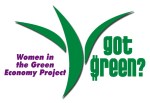Green Women, Healthy Voices: We will be heard!
Women in Southeast Seattle release survey findings and recommendations on the green economy.
SEATTLE – On September 24th 2011, Got Green’s Women in the Green Economy Project will release their survey findings and recommendations to the public at a community event at South Lake High School in Rainier Valley. The new green economy should mean that all communities have access to good paying green jobs, money to buy healthy foods, healthy homes that are energy efficient and free of toxins, and affordable public transportation.
Yet, the voices of low-income women of color in Southeast Seattle are not heard in the green economy. When women’s voices are not heard, families’ health suffers. 35% of the surveys were conducted in a language other than English – including Somali, Spanish, Tigrinya and Vietnamese.
“We started the Women in the Green Economy Project to create a place for women like me — low- income women, women of color, and women from immigrant backgrounds — to raise our voices, front and center, so that we could be a part of this new green economy. If we’re not on the front end of this green movement, it will be another opportunity that leaves us behind,” says Tammy Nguyen, a New Holly resident and founder of the project.
Survey findings conducted by Women in the Green Economy Project and volunteers earlier this year showed that SE Seattle low-income women of color regard good nutrition as THE number one priority for their and their family’s health in a 2:1 margin, followed by green homes. When asked “what is your main barrier to a healthy diet for you and your family?” 78% had a simple answer: COST.
The University of Washington released a study in August 2011 determining that it will cost a family thousands of dollars a year to follow the federal guidelines of a healthy diet; grocery bills dropped significantly if they buy foods high in saturated fats and sugars. It is not out of lack of concern for their family’s health; the real issue is that families with a tight budget during an economic downturn simply cannot afford to buy healthy foods.
Ramata, a low-income single mom joined the Women in Green Project because, “I want to help with getting healthy food – because I know it’s a priority for me and my family – into our communities.” She feels strongly about the food issue as she’s currently breast feeding and wants to control what goes into her body.
The women’s Food Access Organizing Committee is planning their next steps to put more healthy food dollars into the pockets of families in the community. Got Green is also working on the second identified priority -green homes- to ensure that low-income families have healthy and green homes through energy building upgrades and city programs. Survey findings, testimonials, and policy recommendations are compiled in a report to amplify the voices of real women from the most racially diverse and lowest income neighborhood in our city – laying the groundwork for community organizing efforts to include women’s and their families’ priorities in the green economy.
WHAT: “Green Women, Healthy Voices” Community Event Women in Green Economy Report release
WHEN: Saturday, September 24, 2011 12 – 2pm
WHERE: South Lake High School, 8601 Rainier Ave S, Seattle
Child care provided and Interpretation in Spanish, Somali, and Vietnamese
###
Got Green is a grassroots group in the Seattle area led by young adults of color and low-income people that works to make sure the benefits of the green economy – including green jobs, access to healthy food, energy efficient homes, and good public transit – become widely available to low income and communities of color
[slideshow]
Media Contact: Chio Saeturn, 206-406-7128, chio@gotgreen.org
